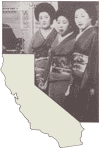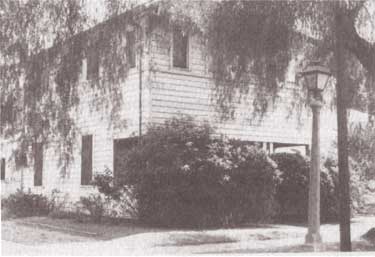![]()

Five Views: An Ethnic Historic Site Survey for California
MENU
Introduction
Immigration
Settlement
Organizations/Religion
Discrimination
World War II Incarceration
Historic Sites
Selected References

A History of Japanese Americans in California:
HISTORIC SITES
Harada House
Riverside, Riverside County
The Harada Case attracted wide attention because it was the first to test the constitutionality of an alien land law in California. In December 1915, Jukichi Harada, a Japanese immigrant, purchased a home in a middle-class neighborhood in the city of Riverside. Harada, who had been proprietor of a restaurant and boarding house for many years in Riverside, wanted a home near a good school for his children. Although the Alien Land Law of 1913 prevented him from owning land, he felt that his three American-born children could legally possess land.
A committee composed of his neighbors tried to persuade Harada to give up the property. Harada refused, saying that he had no interest in the property, and that it was owned by his children. The neighbors brought charges against the Harada family through the Attorney General of California, U. S. Webb. They claimed that Jukichi Harada was an alien not eligible for citizenship under the laws of the United States, and that it was not possible for him to possess, acquire, transfer, or enjoy any real property in the state of California. December 14, 1916 marked the beginning of this important trial: The People of the State of California v. Jukichi Harada, et al.
Two years later, on September 17, 1918, Judge Hugh H. Crain of the Riverside County Superior Court reached a verdict in favor of the Haradas. He found that aliens ineligible for American citizenship could not own land, but that their children born in the United States had rights equal to those of any other citizens.
The property in question was built in the 1870s or 1880s and was originally a one-story "saltbox" cottage with recessed wood siding and a wood shingle roof. Harada had the house remodeled in 1916, and added a second floor with four bedrooms and a bathroom. The dining room was altered to have a lowered ceiling and new plaster.
This case ended in favor of the Haradas, and the Harada family still resides on the property. However, in other jurisdictions, prosecution of Alien Land Law cases resulted in loss of property for Japanese Americans. It was not until after 1952 that they were free from the harassment of this discriminatory law.

Harada House, Riverside, Riverside County
NEXT> Japanese Union Church of Los Angeles
Last Modified: Wed, Nov 17 2004 10:00:00 pm PDT
http://www.cr.nps.gov/history/online_books/5views/5views4h34.htm
![]()
 Top
Top